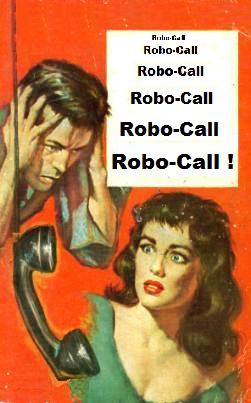Did you know that 69% of American voters received robocalls from politicians in 2010? That is up from 49% in 2008.
There are 208 million registered voters in the United States. A lot of people get political robocalls (automated computer generated phone calls) from politicians.
What if all those voters decided to return the favor by turning the tables on the politicians by robocalling the same politicians that are waking babies up from their naps and interrupting night shift workers’ sleep?
Soon you’ll be able to, with our new website www.ReverseRobocall.com (please click and sign up now to get on our exclusive early invite list).
Wait, aren’t robocalls illegal if you are on the Federal Do Not Call Registry? Yes, if you are a commercial business (think evil mortgage company). No, if you are a politician (think all of them).
That’s right, politicians wrote a law to protect us (and, to be honest, them) from commercial robocall spam, and then went ahead and exempted themselves from the law.
With very few restrictions on politicians at all.
Well, to be honest, no restrictions.
According to the Pew Research Center, political robocalls are now the #1 form of direct voter communications, surpassing that other much-loved communications vehicle, direct mail. That is great for the robocall vendors, not so great for voters and direct mail agencies.
So, with the number of robocalls being made by politicians increasing year over year, and few politicians willing to stop the robocall madness, I thought it was time to fight back with www.ReverseRobocall.com.
How will it work?
Very simply:
- A voter goes to www.ReverseRobocall.com.
- The voter finds the name of the politician(s) robocalling them.
- The voter types in a message to the politician (to be transformed from text to voice).
- The voter agrees to terms and conditions such as “I agree not to robocall politicians at night, while they are sleeping, even though they do that to voters.”
- The voter pays a small fee (think the price of a cup of coffee).
- They press send.
- The system then sends the robocall from the voter to the politician.
- That is it!
How about …. ?
Will you allow me to call politicians at home, while they are sleeping or watching the Super Bowl?
- Nope! While they may like to do that, and can do that, we don’t believe that calling politicians at home is the right thing to do.
So we will only allow calls during business hours and to the main switchboard number(s) for politicians in their main offices and campaign headquarters.
Ed: what do you think of this? Are you going to sign up for, and enjoy, reverse-robocalling your elected representatives? I think I might…
Image: Mike Licht, NotionsCapital.com via Flickr, CC 2.0
 Shaun Dakin is the CEO of www.ReverseRobocall.com and a well-known privacy advocate, particularly for the American voter. In 2007 he founded the non partisan non-profit organization, Citizens for Civil Discourse and the National Political Do Not Contact Registry (www.StopPoliticalCalls.org). In that capacity he helped craft the US Senate Robocall Privacy Act and testified in the US Senate on behalf of the American voter. He is often on CNN, MSNBC, and local media outlets talking about the scourge of robocalls.
Shaun Dakin is the CEO of www.ReverseRobocall.com and a well-known privacy advocate, particularly for the American voter. In 2007 he founded the non partisan non-profit organization, Citizens for Civil Discourse and the National Political Do Not Contact Registry (www.StopPoliticalCalls.org). In that capacity he helped craft the US Senate Robocall Privacy Act and testified in the US Senate on behalf of the American voter. He is often on CNN, MSNBC, and local media outlets talking about the scourge of robocalls.









Thanks all ! Please do sign up for our early launch !
Love!!!! Lol! I’m signing up now!
Hey Shaun, good to see you at Shonali’s place; it’s been a crazy day and I’ll be back, just wanted to say hello.